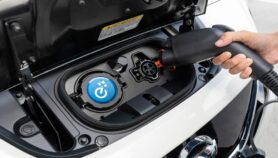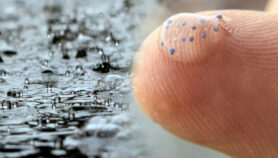Send to a friend
The details you provide on this page will not be used to send unsolicited email, and will not be sold to a 3rd party. See privacy policy.
[CAPE TOWN] Scientists have reversed the action of the humble herbal tea bag to purify water on a small scale. Instead of infusing water with flavour, a sachet sucks up toxic contamination when fitted into the neck of a water bottle.
The researchers, at Stellenbosch University, South Africa, hope communities that have no water-cleaning facilities will use it to purify dirty water.
The sachets are made from the same material used to produce the rooibos tea bags that are popular in South Africa. But inside are ultra-thin nanoscale fibres, which filter out contaminants, plus active carbon granules, which kill bacteria.
"What is new about this idea is the combination of inexpensive raw materials, namely activated carbon and antimicrobial nanofibres, in point-of-use water filter systems," Marelize Botes, researcher in the university’s department of microbiology, told SciDev.Net.
A sachet can clean one litre of the most polluted water. Once used, it is thrown away and a new one is inserted into the bottle neck.
Although the filter is still in development, tests on river samples around Stellenbosch have been successful, said Botes.
"The nanofibres will disintegrate in liquids after a few days and will have no environmental impact. The raw materials of the tea-bag filter are not toxic to humans," she added. Each bag should cost around three South African cents (just under half a US cent).
"Anybody can use it anywhere; it’s affordable, clean and environmentally friendly," said Jo Burgess, manager of South Africa’s Water Research Commission.
The inventor, Eugene Cloete, dean of the faculty of science at Stellenbosch University and chair of Stellenbosch University’s Water Institute, which opened in June, said: "This is a decentralised, point-of-use technology".
Shem Wandiga, managing trustee of the Centre for Science and Technology Innovations, in Kenya said: "A technology that supplies clean water at point of use is preferred to technologies that distribute water due to less recontamination.
"However, given that the majority of people lacking clean water also have meagre incomes, most living on one dollar a day or less, the technology must be affordable or its cost covered by government.
"The major acceptance of the technology by uneducated and untrained person is the proof of the pudding. Sophisticated users will not find difficulty adapting to the technology.
Clean water is still a huge challenge in Sub-Saharan Africa, where 300 million people have no access to clean water according to the World Bank.
The filter is expected to be on the market before the end of the year if approved by the South African Bureau of Standards, which is currently testing it, said Botes.













